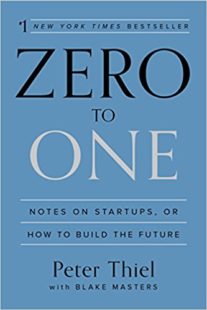Ask any successful person for their magical formula on how they built such a successful startup, and they’ll shrug and either call it luck or hard work– both sounding equally confusing.
But it’s the truth. There is no magical formula that makes startups kick-off and draws Mark Zuckerberg’s attention to buy it.
Welcome to Snapreads! Today’s subject is: stop searching for blueprints– there is no formula for startup success.
Suppose there is the slightest resemblance of what a mathematical formula for startups looks like. In that case, it will be the generic but genuine: hard work + capital + hiring the right people + having goals, and resolving whatever conflicts that ever comes up.
But there’s so much for it, isn’t there? We may not be able to make all your dreams come true with a wave of a wand and give you the formula to success, but we may hand you some of the ingredients—and suggest what to avoid.

Zero to One
by Peter Thiel
⏱ 12 minutes reading time
🎧 Audio version available
There Isn’t A Map
For startups, there is no such thing as a map or even a curriculum to follow.
Because you know what? For every startup that made the same steps as the other, one of them got a hundred customers, and the other, who followed the same steps, got zero customers.
What does this mean? The “rules” that people tell you that startups are biased because successful startups are more like anomalies instead of the example. When you look at statistics, you’re looking at trends, and trends don’t predict outliers; the data point on the graph can be bigger or smaller than the next nearest data point.
This begs the question: what predicts an outlier?
The answer is nothing. Sometimes, a successful startup looks an awful lot like what an unsuccessful startup seems like at the start. So we can’t solely rely on statistics to determine the formula. What’s next? You keep moving.
Why You’re Failing
It seems that only about or even less than 10% of startups find success. So now, we’re going to talk about what makes startups flop, even if they follow all the rules. In their first year of startup infancy, 25% of startups fail. 36% fail in the second year. And 44% of startups fail in their third year.
When they conducted research into what made this staggering number of startups fail, they found three top reasons. The first being lack of customers, which caused 42% of businesses to fail. 29% of them failed because of money problems. And 23% failed because they had been unable to assemble the right team.
There’s No Formula. Only a Solid Plan
At the end of the day, there is no blueprint or a formula– magical or mathematical– that can guarantee success for your startup. But that doesn’t mean you should throw in the towel and give up on your dreams. What you can do is have a solid plan and work the hardest you can.
At first glance, the thought of writing a business plan can seem daunting, but that’s the fundamental pills of every good company. Start by writing down what’s in your head; what you think is the golden million-dollar idea.
Then put down both your short-term goals and your long-term ambitions. That short-term part of the business part should have further detail in what you’re going to do and how you want to go about doing it.
The long-term plan can be a lot more flexible, of course, aiming for growth, but it should be realistically accurate. This plan can change later– and it will change, but that’s what makes a successful startup.
The Pillars of Success
Sometimes, it seems like starting a business is less about business and more about running a marathon with all the odds ridiculously stacked against you.
Again, there’s no magic in this. What we can work with are the pillars of success.
The first thing you want to do is to have a mission. This mission is the reason why you’re doing this, the reason that attracts your customers to you, and the reason that your team stays unified over time. You determine your mission by asking yourself why you’re doing this in the first place.
Then ask why other companies haven’t been able to solve the same problem that you’re solving.
Find the Dream Team
It is an essential part of any business to find the right people to work with.
You can’t start a long-lasting business on your own, so finding talented, passionate people with the right skillset and, most importantly, experiences is beyond essential.
But what you also want is to find people with the right character traits that fit in what your mission intends to achieve. You want this because as your business grows in size, you’ll find that inner conflicts are becoming harder and harder to resolve.
So you want people who are willing to adapt to change and ones that like to establish plans, structures, and processes. People who lack these abilities won’t be able to support a growing organization.
Progressing
Goals, especially short term goals, are essential to making your startup move in the right direction and to support the mission. In each workplace, the team should be striving toward the same goals.
And after this, measure your progress to see if those goals have been accomplished or need more work. By measuring progress, you’re painting a clear picture of the progress– not this one, but the progress towards those long-term ambitions we talked about earlier.
Trust Your Instinct
There are millions of books, articles, and people that claim to have the answer, the perfect way of becoming successful. But the most significant and most trustworthy source for telling you what may be just the thing to make your startup work isn’t a blogging guru. It may be your instinct.
In business, trusting your instinct is imperative. Look at every single successful person in the world. Literally. Every single one. What they all share, all those successful entrepreneurs is their self-belief. Their instinct told them that their idea wasn’t working, so they stopped following that idea. And their instinct told them that consumers would accept this idea, and it was.
That’s not to say you shouldn’t consult with specialists when you’re first starting up, but your best assets you hold are your own mind and instincts.
Outwork, Outlearn
Have you ever watched Shark Tank? The show where aspiring entrepreneurs come up to successful investors and pitch their ideas in hopes that one of them will invest.
Even those investors, those “sharks,” say that they don’t have the answer to success, but what they can tell you– Mark Cuban to be specific states– is that “it’s the willingness to outwork and outlearn everyone…and if it fails, you learn from what happened and do a better job next time.”
When you overcome your failure when that “magic formula” didn’t work, that’s when you start succeeding.
Related: Why (Almost) All Start-Up Businesses Fail
Conclusion
We can’t tell you the magical key to success for your startup, but what we can tell you is this. Do you know what the most common reason why all those entrepreneurs fail on Shark Tank is? Those shark investors hear hundreds of pitches, and they only offer to go in business with a tiny fraction of the entrepreneurs that pitch their startups.
It’s because they’re unprepared.
Those investors don’t care about how game-changing your product is if you don’t even know your own stuff. You want to have all the math prepared– before you go on Shark Tank and launch your dream startup and expect success.
You want to have every single number associated with producing your product. You want your sales goal ready, the manufacturing costs memorized, the expected investments, and how much you need.
At this moment, it helps to ask for consultation experts such as other business owners and accountants to help you crunch the numbers. Their experience, which is the world we keep coming back to, will make your startup make sense.
Believe in Your Product
60% of ambitious entrepreneurs say that their reason for starting a business is because they want to capitalize and make money on a business plan. 8% of ambitious entrepreneurs succeed. How is it that the scary majority of people cannot even convince investors of their business plan?
It’s because they’re focused and fixated on the dollar signs that they want to earn and don’t believe in their product. When you’re focused on that, it’s easier to give up on your product.
Look beyond instant gratification and immediate finance and believe in the long-term potential of your business. You started this for a reason.
So finding success doesn’t require a blueprint, nor is there a magical or mathematical or physics formula that you can calculate that will show you how to make your startup become worth millions of dollars.
And what may have worked in the past may not work again. See how complicated it is? What you can do is put in the hard work until you gain experience. You can then use that experience, and soon enough, following a formula will be the last thing you want to do.
What Is Snapreads?

With the Snapreads app, you get the key insights from the best nonfiction books in minutes, not hours or days. Our experts transform these books into quick, memorable, easy-to-understand insights you can read when you have the time or listen to them on the go.


